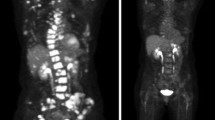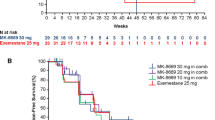Abstract
EGFR signalling pathways appear involved in endocrine therapy resistance in breast cancer. This trial estimates the antitumor efficacy and toxicity of the EGFR tyrosine kinase inhibitor gefitinib in combination with anastrozole or fulvestrant in postmenopausal hormone receptor positive breast cancer. Subjects with estrogen receptor and/or PgR positive, metastatic breast cancer were randomized into this phase II study of gefitinib (initial dose was 500 mg orally daily, due to high rate of diarrhea, starting dose was reduced to 250 mg orally daily) with either anastrozole 1 mg daily or fulvestrant 250 mg every 4 weeks. The primary endpoint was clinical benefit (complete responses plus partial responses plus stable disease for 6 months or longer). 141 eligible subjects were enrolled, 72 in the anastrozole plus gefitinib arm, and 69 in the fulvestrant plus gefitinib arm. Anastrozole plus gefitinib had a clinical benefit rate of 44% [95% confidence interval (CI) 33–57%] and fulvestrant plus gefitinib 41% (95% CI 29–53%). Median progression-free survival was 5.3 months (95% CI 3.1–10.4) versus 5.2 months (95% CI 2.9–8.2) for anastrozole plus gefitinib versus fulvestrant plus gefitinib, respectively. Median survival was 30.3 months (95% CI 21.2–38.9+) versus 23.9 months (95% CI 15.4–33.5) for anastrozole plus gefitinib versus fulvestrant plus gefitinib, respectively. In general, the toxicity is greater than expected for single agent endocrine therapy alone. Anastrozole plus gefitinib and fulvestrant plus gefitinib have similar clinical benefit rates in the treatment of estrogen and/or PgR positive metastatic breast cancer, and the rates of response are not clearly superior to gefitinib or endocrine therapy alone. Further studies of EGFR inhibition plus endocrine therapy do not appear warranted, but if performed should include attempts to identify biomarkers predictive of antitumor activity.


Similar content being viewed by others
References
Nicholson RI, McClelland RA, Gee JM, Manning DL, Cannon P, Robertson JF, Ellis IO, Blamey RW (1994) Epidermal growth factor receptor expression in breast cancer: association with response to endocrine therapy. Breast Cancer Res Treat 29(1):117–125
Hiscox S, Morgan L, Barrow D, Dutkowskil C, Wakeling A, Nicholson RI (2004) Tamoxifen resistance in breast cancer cells is accompanied by an enhanced motile and invasive phenotype: inhibition by gefitinib (‘Iressa’, ZD1839). Clin Exp Metastasis 21(3):201–212. doi:10.1023%2FB%3ACLIN.0000037697.76011.1d
Kurebayashi J (2005) Resistance to endocrine therapy in breast cancer. Cancer Chemother Pharmacol 56(Suppl 1):39–46. doi:10.1007/s00280-005-0099-z
Arpino G, Green SJ, Allred DC, Lew D, Martino S, Osborne CK, Elledge RM (2004) HER-2 amplification, HER-1 expression, and tamoxifen response in estrogen receptor-positive metastatic breast cancer: a southwest oncology group study. Clin Cancer Res 10(17):5670–5676. doi:10.1158/1078-0432.CCR-04-0110
Massarweh S, Osborne CK, Creighton CJ, Qin L, Tsimelzon A, Huang S, Weiss H, Rimawi M, Schiff R (2008) Tamoxifen resistance in breast tumors is driven by growth factor receptor signaling with repression of classic estrogen receptor genomic function. Cancer Res 68(3):826–833. doi:10.1158/0008-5472.CAN-07-2707
Frogne T, Benjaminsen RV, Sonne-Hansen K, Sorensen BS, Nexo E, Laenkholm AV, Rasmussen LM, Riese DJ 2nd, de Cremoux P, Stenvang J, Lykkesfeldt AE (2009) Activation of ErbB3, EGFR and Erk is essential for growth of human breast cancer cell lines with acquired resistance to fulvestrant. Breast Cancer Res Treat 114(2):263–275. doi:10.1007/s10549-008-0011-8
Klijn JG, Berns PM, Schmitz PI, Foekens JA (1992) The clinical significance of epidermal growth factor receptor (EGF-R) in human breast cancer: a review on 5232 patients. Endocr Rev 13(1):3–17. doi:10.1210/er.13.1.3
Gutteridge E, Agrawal A, Nicholson R, Leung Cheung K, Robertson J, Gee J (2010) The effects of gefitinib in tamoxifen-resistant and hormone-insensitive breast cancer: a phase II study. Int J Cancer 126(8):1806–1816
Therasse P, Arbuck SG, Eisenhauer EA, Wanders J, Kaplan RS, Rubinstein L, Verweij J, Van Glabbeke M, van Oosterom AT, Christian MC, Gwyther SG (2000) New guidelines to evaluate the response to treatment in solid tumors. European Organization for Research and Treatment of Cancer, National Cancer Institute of the United States, National Cancer Institute of Canada. J Natl Cancer Inst 92(3):205–216. doi:10.1093/jnci/92.3.205
National Cancer Institute: Common terminology criteria for adverse events v2.0 (CTCAE) (2010) http://ctep.cancer.gov/protocolDevelopment/electronic_applications/ctc.htm. Accessed 17 March 2010
Howell A, Mackintosh J, Jones M, Redford J, Wagstaff J, Sellwood RA (1988) The definition of the ‘no change’ category in patients treated with endocrine therapy and chemotherapy for advanced carcinoma of the breast. Eur J Cancer Clin Oncol 24(10):1567–1572. doi:10.1016/0277-5379(88)90046-6
Robertson JF, Howell A, Buzdar A, von Euler M, Lee D (1999) Static disease on anastrozole provides similar benefit as objective response in patients with advanced breast cancer. Breast Cancer Res Treat 58(2):157–162. doi:10.1023/A:1006391902868
Robertson JF, Willsher PC, Cheung KL, Blamey RW (1997) The clinical relevance of static disease (no change) category for 6 months on endocrine therapy in patients with breast cancer. Eur J Cancer 33(11):1774–1779. doi:10.1016/S0959-8049(97)00178-0
Kaplan EL, Meier P (1958) Nonparametric estimation from incomplete observations. J Am Stat Assoc 53:457–481. doi:10.2307/2281868
Brookmeyer R, Crowley J (1982) A confidence interval for the median survival time. Biometrics 38:29–41. doi:10.2307/2530286
Robertson JF, Osborne CK, Howell A, Jones SE, Mauriac L, Ellis M, Kleeberg UR, Come SE, Vergote I, Gertler S, Buzdar A, Webster A, Morris C (2003) Fulvestrant versus anastrozole for the treatment of advanced breast carcinoma in postmenopausal women: a prospective combined analysis of two multicenter trials. Cancer 98(2):229–238. doi:10.1002/cncr.11468
Di Leo A, Jerusalem G, Petruzelka L, Torres R, Bondarenko IN, Khasanov R, Verhoeven D, Pedrini JL, Smirnova I, Lichinitser MR, Pendergrass K, Garnett S, Lindemann JP, Sapunar F, Martin M (2010) Results of the CONFIRM phase III trial comparing fulvestrant 250 mg with fulvestrant 500 mg in postmenopausal women with estrogen receptor-positive advanced breast cancer. J Clin Oncol 28(30):4594–4600. doi:10.1200/JCO.2010.28.8415
Smith IE, Walsh G, Skene A, Llombart A, Mayordomo JI, Detre S, Salter J, Clark E, Magill P, Dowsett M (2007) A phase II placebo-controlled trial of neoadjuvant anastrozole alone or with gefitinib in early breast cancer. J Clin Oncol 25(25):3816–3822. doi:10.1200/JCO.2006.09.6578
Cristofanilli M, Valero V, Mangalik A, Royce M, Rabinowitz I, Arena FP, Kroener JF, Curcio E, Watkins C, Bacus S, Cora EM, Anderson E, Magill PJ (2010) Phase II, randomized trial to compare anastrozole combined with gefitinib or placebo in postmenopausal women with hormone receptor-positive metastatic breast cancer. Clin Cancer Res 16(6):1904–1914. doi:10.1158/1078-0432.CCR-09-2282
Carlson RW, Henderson IC (2003) Sequential hormonal therapy for metastatic breast cancer after adjuvant tamoxifen or anastrozole. Breast Cancer Res Treat 80(Suppl 1):S19–26. doi:10.1023/A:1025459232293 (discussion S27–18)
Houston SJ, Plunkett TA, Barnes DM, Smith P, Rubens RD, Miles DW (1999) Overexpression of c-erbB2 is an independent marker of resistance to endocrine therapy in advanced breast cancer. Br J Cancer 79(7–8):1220–1226. doi:10.1038/sj.bjc.6690196
Nicholson RI, Hutcheson IR, Harper ME, Knowlden JM, Barrow D, McClelland RA, Jones HE, Wakeling AE, Gee JM (2002) Modulation of epidermal growth factor receptor in endocrine-resistant, estrogen-receptor-positive breast cancer. Ann N Y Acad Sci 963:104–115. doi:10.1111/j.1749-6632.2002.tb04101.x
Kurebayashi J, Okubo S, Yamamoto Y, Sonoo H (2004) Inhibition of HER1 signaling pathway enhances antitumor effect of endocrine therapy in breast cancer. Breast Cancer 11(1):38–41. doi:10.1007/BF02968000
Massarweh S, Osborne CK, Jiang S, Wakeling AE, Rimawi M, Mohsin SK, Hilsenbeck S, Schiff R (2006) Mechanisms of tumor regression and resistance to estrogen deprivation and fulvestrant in a model of estrogen receptor-positive, HER-2/neu-positive breast cancer. Cancer Res 66(16):8266–8273. doi:10.1158/0008-5472.CAN-05-4045
Creighton CJ, Massarweh S, Huang S, Tsimelzon A, Hilsenbeck SG, Osborne CK, Shou J, Malorni L, Schiff R (2008) Development of resistance to targeted therapies transforms the clinically associated molecular profile subtype of breast tumor xenografts. Cancer Res 68(18):7493–7501. doi:10.1158/0008-5472.CAN-08-1404
Acknowledgments
This study was conducted by the Eastern Cooperative Oncology Group (Robert L. Comis, MD, Chair) and supported in part by Public Health Service Grants CA23318, CA66636, CA21115, CA49883 and from the National Cancer Institute, National Institutes of Health and the Department of Health and Human Services. Its contents are solely the responsibility of the authors and do not necessarily represent the official views of the National Cancer Institute.
Conflict of interest
Dr. Carlson is the recipient of a grant to his institution for funding of a clinical research study. No other author has a known conflict of interest.
Author information
Authors and Affiliations
Corresponding author
Rights and permissions
About this article
Cite this article
Carlson, R.W., O’Neill, A., Vidaurre, T. et al. A randomized trial of combination anastrozole plus gefitinib and of combination fulvestrant plus gefitinib in the treatment of postmenopausal women with hormone receptor positive metastatic breast cancer. Breast Cancer Res Treat 133, 1049–1056 (2012). https://doi.org/10.1007/s10549-012-1997-5
Received:
Accepted:
Published:
Issue Date:
DOI: https://doi.org/10.1007/s10549-012-1997-5




